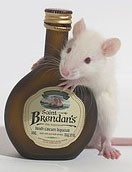Rats Fed a High Fat Diet Develop a Tolerance to the Pleasures of Eating
Rats fed an ‘all you can eat’ buffet diet of cheesecake and bacon may provide answers to questions about the root causes of overeating behaviors and obesity.
A cocaine tolerance - sure, an alcohol tolerance, also yes…but a bacon tolerance; is it possible?
Yes, according to scientists at the Scripps Research Institute, who looked at the reward centers in the brains of rats fed a very high fat diet.
Laboratory rats were fed a diet of cheesecake, bacon, sausage and chocolate; and were given access to as much food as they could eat. After a while, the rats became accustomed to the rich fare and unfortunately, eating triggered a lesser reward reaction in the brain. Once this occurred, rats started overeating and become obese. They would even continue to overeat when the high fat food was presented with a small electric shock, as a negative behavioral consequence.
Additionally, once the rats become used to the high fat food, they wouldn’t eat healthy food, even when that was all that was offered.
Lead researcher, Paul J. Kenny, explained that the results show how similar overeating and chemical addictions can be, saying that the way the rats’ brains become less responsive to the pleasures of food “was similar to what our laboratory has seen previously in rats as they become addicted to cocaine or heroin. The data suggest that obesity and addiction may result from common neuroadaptations."
This research was presented at Neuroscience 2009, in Chicago.


